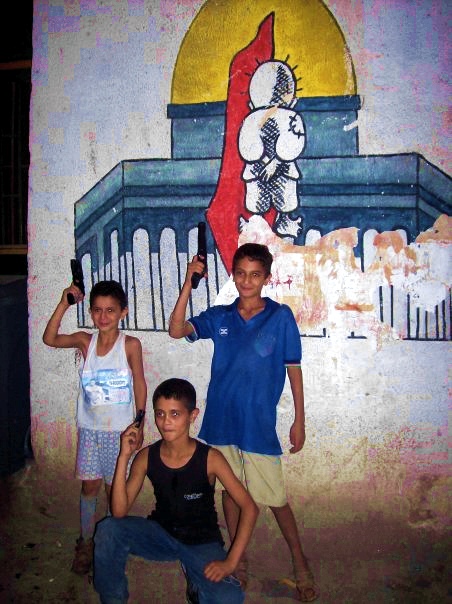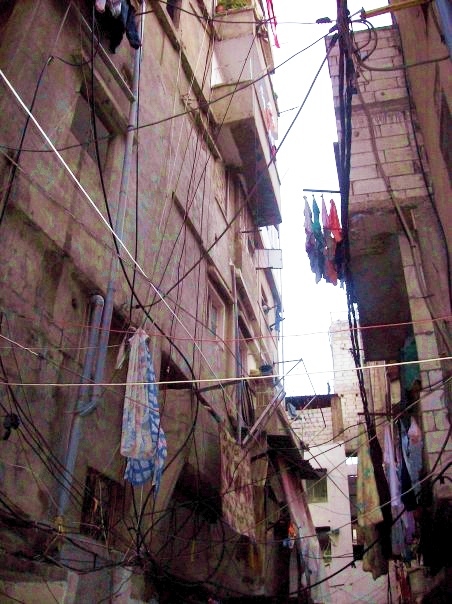You have no items in your cart. Want to get some nice things?
Go shopping
“I am terrorist”, the teenage boy says and he laughs. His friend leans on his shoulder and flashes a beaming set of straight white teeth.
I am on my way to meet the director of the Children and Youth Centre of Shatila Refugee Camp in the suburbs of Beirut. It is just a 15 minute drive from the ultra-modern downtown where families stroll along the waterfront and 18-year-olds, more fortunate than the two I am talking to, cruise around in Peugeots pumping Arabic pop music and smoke hookah before an explosive red-and-yellow sunset.
Even though Shatila is called a refugee camp, it is actually a neighbourhood and its inhabitants are not refugees; the younger generation were born here, the older have called it home for 30 years. It is a maze of seven-storey matchbox compartments, filthy grey and draped with layers of washing, the concrete balconies towering over narrow alleys strewn with rubbish and soaked in sewage. The gap between the buildings, sometimes no more than a metre or two wide, is hung with an ugly net of thick black cables, so low you could put your hand up and touch them.
Under this mess of electrical wires, the children play. “Take photo, take photo!” they shout, posing with their two fingers raised in the international sign of peace. Snap! They scurry to grab some toys that lie scattered about the paved concrete. “Take photo, take photo!” they cry again and this time they hold plastic guns in the air, brandishing these fake weapons above their heads. Snap.
Behind them, the walls are painted thick with a jumble of Palestinian flags, images of jail bars and chains, burning American flags, a swastika staring from anti-Israeli scribblings. The bricks are plastered with peeling posters of heroes who have defied America and Israel – an unlikely combination of Yasser Arafat, Saddam Hussein and Che Guevara.
They flock around me to ask where I am from, and mishear the word Australia. “Israel! You from Israel!” and the hate glimmers across a six-year-old’s eyes, “Yahod! Yahod!” His four-foot companions take up the cry. “Jew!” There is no space for the kids to run around in the cramped alleys so they are crammed into the two cybercafes where they use virtual guns to shoot animated soldiers.
When two young men walk past strapped with bullet-proof vests and carrying huge semi-automatic guns, not one of these children bats an eyelid.
An old lady sitting in a doorway beckons me toward the single room she lives in and makes me tea over the flame of a gas stove on the floor beside her mattress. On the walls hang photos of her three sons, all killed before they reached middle age. When I ask her about the armed men, she mutters “security” and says no more.
The boy who called himself a terrorist is still watching me: “Welcome to Shatila,” he grins. “Welcome to Paradise.” They are two beautiful boys with smooth Arabian complexions and gelled hair, dressed in jeans, fitted t-shirts and hightop sneakers. You could find them in a nightclub in London. But they are here.
Mahmoud has come from a camp in North Lebanon which has been under siege by the Lebanese army for ten days. He smiles when he says that his brother was killed last week. He smiles when he describes how he ran from the camp alone when there was a break in the fighting. He tells me that his mother is still back there along with several thousand residents because she is tired of running, but now he is looking at the ground and shuffling the gravel beneath his feet.
“Who helped you escape?” I ask. The question seems to take him by surprise. He flashes a look of defiance. “Nobody.”
The Palestinians of northern Lebanon have recently fled to Shatila, refugees from a refugee camp. Hundreds of families in Shatila opened their tiny homes to welcome the strangers. A few days later, when fighting erupted at another camp in the south causing thousands more to flee, more people were packed into the massively overcrowded 40,000 square metres that already houses at least 17,000 people.
Palestinians in Lebanon are banned from owning their own homes outside of designated areas, Mahmoud explains. Confined to squalid areas like Shatila and barred from well-paid jobs, those that can find employment at all work only the most menial jobs for a pittance. They will never possess Lebanese citizenship; nor will their children or grandchildren.
He tells me that only 20 percent can afford to go to university, usually funded by militant groups. He was at college in the north but there is no chance he will finish it now. “And the other 80%?” I ask. Mahmoud shrugs.
“Rubbish“, his friend says quickly, grinning again. “We are not people, just rubbish.”
As I continue through the narrow streets of the camp, I am ushered in for cups of tea and puffs of water pipe. Crowded around a dinner table with four generations of two Palestinian families, we dig into hummus and falafel with our fingers from a communal dish among scores of children, distant relatives and neighbours. The door is always open, literally, as friends pop their heads through the window and stroll in and out.

After dinner, we sit in front of a television, flicking perpetual news from channel to channel. One family has come from the camp in the north, they have no homes to return to and what will happen tomorrow and the day after is unknown. A 19-year-old girl giggles and clutches my arm, speaking the only English she knows: “I love you!” and giggles again. Her fiancé sits beside her, they should have been married last week but the shelling intervened.
They all fall silent when their camp appears on the screen, projectile missiles ripping through and dissolving buildings into smoke and rubble. There are friends and family trapped inside the concrete blocks that have just vanished before our eyes. The two older women look exhausted and a younger man turns to me and with one hand he indicates around him to the children squatting on the carpet before the TV: “We are all afraid,” he says.
When I finally arrive at the Children and Youth Centre, responsible for keeping the children distracted from their own lives, director Abu Moujahed pulls open a drawer for me and unloads one knife after another that he has confiscated from the kids. Kitchen knives, Swiss army knives, pocket knives.
“The parents, they do nothing”, he sighs. “How can we stop these children from becoming delinquents if the parents have given up?” Outside in the tiny concrete square that serves as the only playground, some kids kick a tennis ball around because they don’t have a football. “So what can we do?”
“You know”, he goes on; “we have a joke in Shatila. The devil comes to take a man to hell. The man tells him, ‘I will be happy to go with you because anything must be better than here.’”
But Shatila doesn’t make a believer of everyone. “If you visit this place”, Abu Moujahed says before I leave, “you will know that God doesn’t exist.”

About Claire Harris
Claire Harris holds a master's degree in writing. Her short stories and articles have appeared in publications in the United States, United Kingdom and Australia. In 2010, she won the Australian Red Cross Essay Contest. She has been traveling the world since 2003, visiting the Middle East, West Africa and South America.




Toy Guns and Pocket Knives in Beirut | Litro https://t.co/sO12lo9Rtf